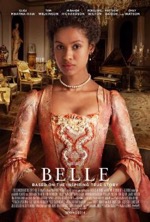Belle (PG)
05/06/14 22:55 Filed in: 2014

Starring: Gugu Mbatha-Raw
May 2014
This review was originally tweeted in Real-time from the back row of a movie theater and appears @BackRoweReviews. Though efforts were made to tease rather than ruin this movie’s memorable lines and moments, some spoilers may exist in the following evaluation. The original tweets appear in black, while follow-up comments appear in red. For concerns over objectionable content, please first refer to one of the many parental movie guide websites. All ratings are based on a four star system. Happy reading!

The premise is immediately established.
Most of what was shown in the trailer transpires in the first five minutes of the movie, which is a welcome change from the usual preview that ruins every key moment, line or action scene in a film. There’s something refreshing about being “cinematically blind,” not knowing what’s coming around the next bend story wise. It’s one of the many reasons why movies were so thrilling during the golden age of cinema.
Wilkinson and Watson puzzle over Belle’s future.
Belle’s real name is Dido, but I didn’t want to Tweet that name for fear of misspelling it to my own eternal shame and ridicule.
Whispering in French raises auntie’s ire.
Good moral debate over human cargo.
It’s unbelievable to think that we once had arguments over such an issue…that there actually could be two legitimate sides on such a topic.
“Coming out” meant something completely different in those days.
“Wait for no man, dear.” Ha!
The seeds of women’s lib?
“Just as in life, we’re no better in paintings.” Poignant.
I must say that I don’t recall ever having seen a painting from this era with a person of African descent featured in it before seeing the many such paintings displayed in this film. But I’m certainly not an art connoisseur from the period in question…or any other for that fact.
James is a creep...the “manhandled” scene is repulsive.
Argument in carriage is intense.
I don’t think I’d ever lock horns with Wilkinson. Remember when he went off on George Clooney in Michael Clayton (2007)? “I am Shiva, the god of death.” Now that’s gravitas.
Wilkinson sees himself in a fiery young politician. A superb scene.
“Let justice be done though the heavens may fall.” Wilkinson’s ruling is an amazing moment.
A great quote, but an even better scene. The verdict isn’t nearly as epic as the one in To Kill a Mockingbird (1962), but it’s still provides a rousing resolution.
Final analysis: a deeply-affecting true story that tackles such heavy issues as racism & slavery in the late 1700s.
Rating: 3 out of 4 stars. Splits its time between familial and political intrigue. A moving, inspiring tale.
This isn’t the first “true story” film to highlight events during the pre-Victorian period. This certainly isn’t the first movie to feature matchmaking mothers intent on marrying off their daughters to this rich relative or that powerful duke…look no further than Jane Austen’s Pride and Prejudice (1940) for a master class on the subject. This also isn’t the first film to spotlight the social blight of slavery during this time period; one really good story on the subject is that of humanitarian William Wilberforce in Amazing Grace (2006). What is new here is the story of a young black woman who grows up on an estate with a staid, white, aristocratic family. Imagine dropping a black girl into Downton Abbey and the effect would be about the same. Dido’s (Gugu Mbatha-Raw) plight, which immediately creates identification and pathos in the audience, is the one plot point that keeps the movie from being just another finely mounted, well acted costume drama. Her struggle for acceptance and equality is inspiring and captivating: we can only imagine what Dido endured as someone too good to eat with the servants but not good enough to eat with her “family.” The social commentary, which is chiefly preoccupied with human rights, is subtle throughout and we can thank Misan Sagay that the writing never gets heavy-handed. It goes without saying that the acting is amazing, but it’s worth mentioning just the same. Wilkinson and Watson are well suited as Dido’s adoptive parents and Mbatha-Raw is a revelation as the delightful yet redoubtable title character, a brave woman who fights for self-respect while fighting for the fate of her race. In the end, the movie succeeds because there are many familiar features from other such period pieces to make the story accessible along with enough new elements to keep us engaged and entertained from the outset. Add this to the pantheon of well acted, well produced and well written historical dramas.